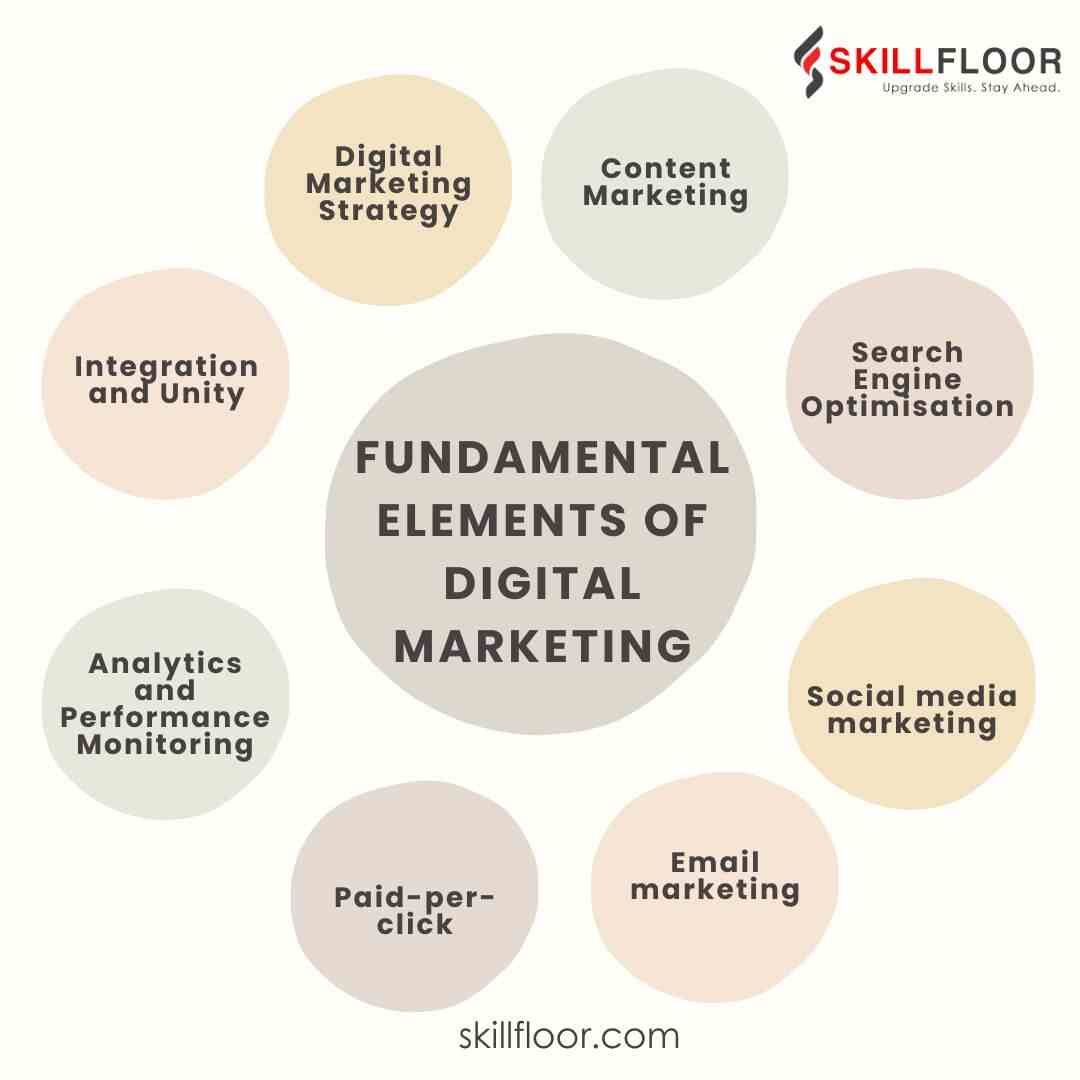Fundamental Elements of Digital Marketing
Discover the basics of digital marketing, from SEO to social media. Learn how to boost your online presence with simple strategies for success.

The key elements of digital marketing comprise a unified approach designed to optimize online presence, interaction, and sales. A well-designed website that is search engine optimized (SEO) is the first step in this plan. Valuable content production and transmission are added later. Fostering customer relationships and expanding brand reach can be achieved through using social media platforms and targeted email campaigns. Pay-Per-Click advertising supports these initiatives by bringing in targeted visitors, and digital analytics offer priceless information for adjusting strategies and gauging results. In the end, conversion rate optimization helps businesses expand and be profitable in the digital sphere by making sure that website visitors are efficiently directed toward desired actions.
Many organizations, particularly small and medium-sized ones, find it difficult to stay up to date with the rapid changes and improvements in elements of digital marketing in the constantly evolving digital environment. Even though these companies are aware of how crucial digital marketing is to connecting with their target customers and increasing revenue, they frequently encounter difficulties putting the many components of digital marketing into practice and mixing them into an integrated plan. Their marketing efforts may become ineffective and chances may be lost as a result of this execution gap.
Key challenges in integrating multiple digital marketing channels effectively
Unity: It can be challenging to develop a consistent brand voice and message across a variety of media. Because every channel has a different audience and style, it can be difficult to deliver messaging consistently.
Audience Segmentation: The target audience is drawn to distinct parts by different channels. It's critical to understand how to customize tactics and material for every market segment while preserving a consistent company identity.
Resource Allocation: It can be difficult to properly distribute resources, such as money, time, and staff, among several channels. It is crucial to balance investments across channels to for the greatest return on investment.
Performance tracking: Analysing and contrasting different channels' performances might be difficult. It can be challenging to get a complete picture of the success of digital marketing as a whole because various indicators and KPIs may apply to different channels.
Data Integration: Because reporting formats and metrics vary, integrating data from several channels can be difficult. Effective collection of data and analysis needs tools and tactics from businesses.
Customer Journey: It's critical to map and oversee the customer journey using a variety of digital marketing platforms. Consumers frequently engage with a company through a variety of touchpoints, so offering a seamless experience is crucial.
material Distribution: Repetition or inconsistencies may arise from producing and disseminating material across several channels. The key is to maintain a content calendar and make sure that each channel has current, pertinent information.
Channel-Specific Strategies: A different strategy is needed for every digital marketing channel. Since PPC advertising, email marketing, and social media each has unique strategies, it might be difficult to develop specialized plans for each platform.
What are the fundamental elements of digital marketing

Digital Marketing Strategy: The foundation of an effective digital marketing effort is a thorough strategy. Goals, the intended audience, and key performance indicators (KPIs) are described. The plan must be in line with the company's overarching objectives and offer a detailed implementation schedule for digital marketing components.
Content Marketing: In the digital field, content reigns supreme. Developing insightful, timely, and dependable content is a key component of a successful content marketing plan that draws in and engages a target audience. Content kinds that are aimed at connecting with the target audience include infographics, videos, blog articles, and more.
Search Engine Optimisation (SEO): Increasing online presence requires SEO. For a website to rank higher on search engines like Google, optimisation of the content, website structure, and metadata is required. Good SEO increases organic traffic and makes the company more accessible to prospective clients.
Social media marketing: Social media sites offer a chance to interact with clients directly, increase brand recognition, and advertise goods and services. Selecting suitable social media channels, producing interesting content, and promoting deep connections with the audience are the core elements of a successful social media marketing plan.
Email marketing: Email marketing is still a highly effective way to develop leads and keep in touch with customers. Segmentation to provide pertinent messages to various audience segments, automated workflows, and personalized content are all parts of an efficient email marketing plan.
Paid-per-click (PPC) advertising: PPC strategies, like social media and Google Ads, can swiftly bring relevant traffic to a landing page or website. To maximize return on investment, an effective PPC plan includes keyword research, ad development, and performance tracking.
Analytics and Performance Monitoring: Monitoring the results of online marketing campaigns is essential for ongoing development. Social networking and Google Analytics are two examples of tools that offer insights into what is and is not working. Frequent analysis makes methods more effective and helps achieve goals faster.
Integration and Unity: Combining these components into an organized strategy is essential for effective digital marketing. Together, social media, SEO, content marketing, and other elements should strengthen one another to build an integrated online presence that advances corporate objectives.
A coordinated digital marketing plan is essential for business success in the lively digital world of today. To establish an effective online presence, the necessary components—content marketing, SEO, social media marketing, email marketing, PPC advertising, and analytics—all operate in tandem. Effectively blending these elements can be difficult, though, especially for startups. Through resource optimization, channel-specific strategy development, and ongoing performance monitoring, companies may design a digital marketing plan that promotes growth, increases brand awareness, and builds long-term success.




























































